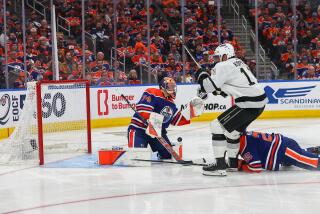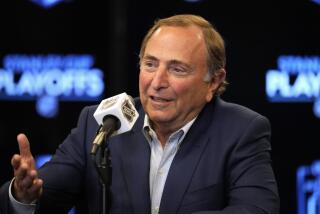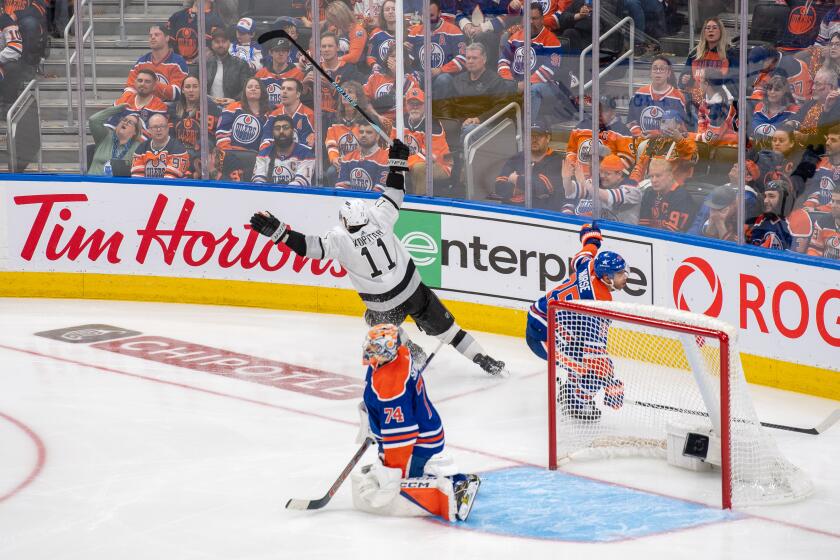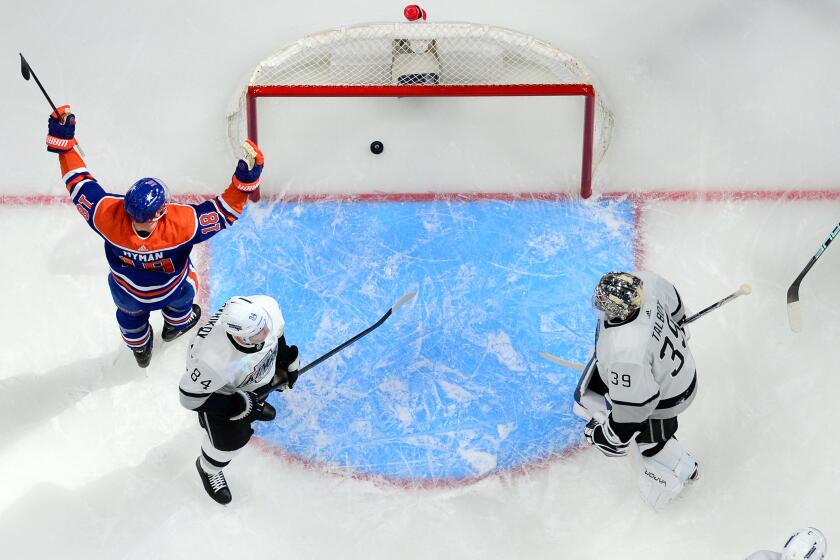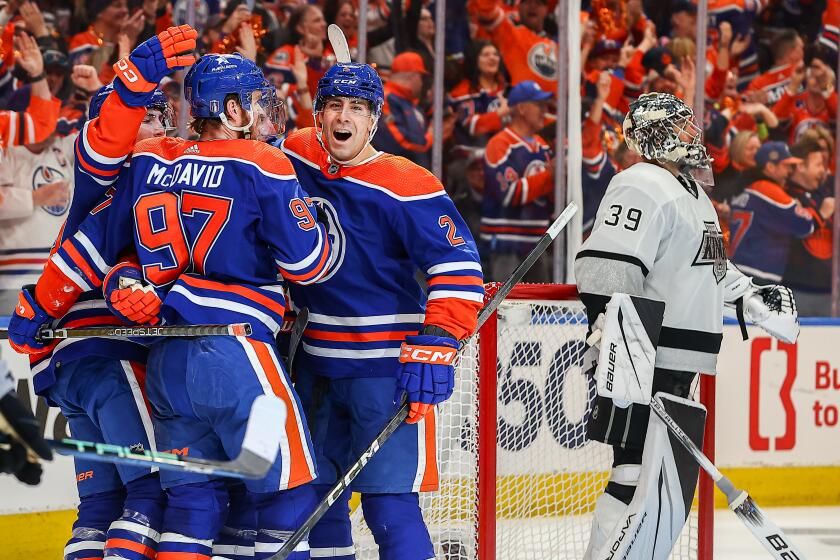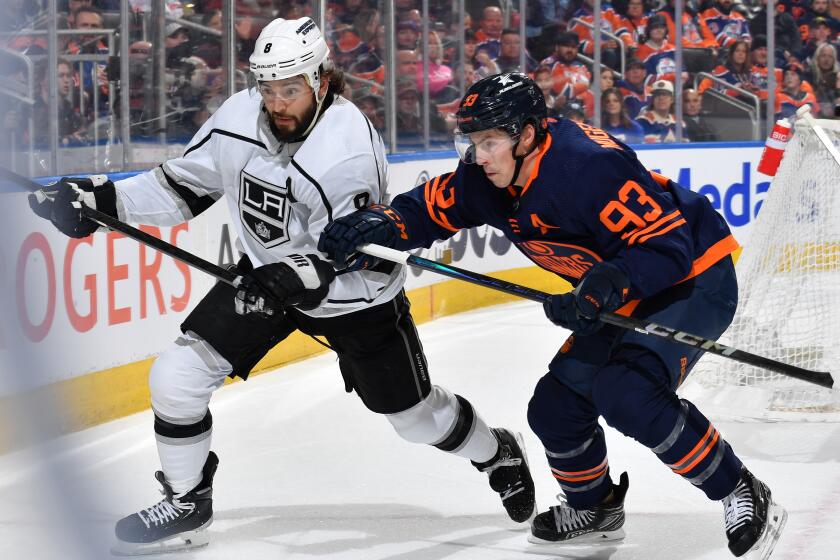Blackhawks are on verge of capping their rapid rise with a Stanley Cup title
John McDonough almost couldn’t bear it when friends told him a few years ago that Chicago Blackhawks games were drawing 3,000 fans at the cavernous United Center, flashing back to childhood memories of standing at the old Chicago Stadium because there were no seats to be had in that smoky, passion-rocked arena.
The Blackhawks he once loved had become a rudderless mess, invisible in a sports-mad city.
“I was a huge fan and always followed the Blackhawks and really saw the decline as sad,” said McDonough, who then was working his marketing magic on the 0-since-1908 Cubs. The lovable losers became a cash cow as he popularized their history and ivy-covered ballpark and expanded their reach through Superstation WGN.
“I think anybody that’s in sports here in Chicago in a management position always looked over the fence and said, ‘Wow, if I ever had the opportunity to play a role in the resurgence of the Blackhawks, if I ever had a chance to participate in what could be a really dramatic changeover, that would be something.’ ”
He got that chance in 2007 and has engineered a stunningly swift rebirth.
Just 2½ years after their season- ticket base plunged to about 3,400 and two seasons after missing the playoffs, the Blackhawks will draw their 100th consecutive sellout Saturday night when they open the Stanley Cup finals against the Philadelphia Flyers (Ch. 4, 5 p.m. PDT).
The Blackhawks are favored to beat the surprise Eastern Conference champions, which would end the NHL’s longest Cup drought at 49 years. The city that shunned the Blackhawks is now illuminated in red to celebrate them.
“There was certainly a lot of time when you were wondering what’s going on with this team, this organization,” said defenseman Duncan Keith, who made his Blackhawks debut in the 2005-06 season.
“It’s a privilege to play on this team now and to be a part of it.”
The wheels of change began turning Sept. 26, 2007, with the death of owner Bill Wirtz at 77. He had refused to air home games on television, supposedly to protect season-ticket holders, and he let many star players leave on bad terms while retaining executives who compounded his misjudgments. The Blackhawks lost an entire generation of fans.
Wirtz’s son Rocky became the team’s chairman Oct. 5, 2007. Six weeks later, he hired McDonough.
“When I was offered the position to come over here I knew that it was going to be a challenge,” said McDonough, a lifelong Chicagoan. “It’s every bit the challenge that I thought — and then some.”
Among his first moves was welcoming back Hall of Fame forwards Bobby Hull and Stan Mikita as ambassadors. Goalie Tony Esposito returned to the fold, too. Former Blackhawks were honored and traditions renewed.
Previous executives “were in the grudge business here. We had to get out of that,” McDonough said. “And really, in order for us to sell the future or sell the current team we had to have a relationship with our past.”
In April 2008, the Blackhawks announced plans to televise every regular-season and playoff game, a club first.
“That was something that had to be an absolute with me,” McDonough said, crediting Wirtz with making it happen.
Thanks to years of poor finishes and prime draft picks, they began to give fans something worth watching.
Patrick Kane, chosen first overall in 2007, was voted the 2008 rookie of the year. Jonathan Toews, chosen third in 2006, joined Kane on the all-rookie team. Keith and Brent Seabrook became an elite defense pair. After years of keeping their wallets shut, the Blackhawks signed some prominent free agents, luring defenseman Brian Campbell from Buffalo and goaltender Cristobal Huet.
Catering to fans, McDonough instituted a winter convention that brought players and the public closer. He also got the Blackhawks into the Winter Classic outdoor game at Wrigley Field on New Year’s Day 2009, an artistic and commercial success.
Not every move worked. Campbell struggled until this season and Huet lost the starting job to Antti Niemi. Denis Savard, a popular player but overmatched as a coach, was replaced by Joel Quenneville in October 2008. General Manager Dale Tallon, who made many shrewd draft picks but botched some contract deadlines that cost the club big bucks, was demoted and replaced by Stan Bowman, who appointed his father, Scotty, a Hall of Fame coach, an advisor.
“There were some tough years there when it seemed like nothing was ever going to get better,” said winger Patrick Sharp, who was acquired in a 2005 trade with the Flyers, “but we’ve got some big efforts from a lot of players on our team and people in the front office as well that have done some great things to get this organization to where it is.”
They’re on the cusp of a championship, and McDonough called the city “intoxicated.” Chicagoans who probably didn’t know a year ago that Dustin Byfuglien’s surname is pronounced “BUFF-lin” wear T-shirts and jerseys bearing his name. The massive bronze lions that guard the entrance to the Art Institute were outfitted with Blackhawks helmets in a ceremony attended by Hull, who never wore a helmet himself.
“It’s pretty crazy,” Byfuglien said. “The city’s definitely changed. It’s nice to see. Everywhere you go, people know who you are.”
Their journey from obscurity to center stage isn’t over yet.
“I am thrilled for the city of Chicago. I am thrilled for our fan base,” McDonough said. “And I’m happiest that people gave us a second chance.”
twitter.com/helenenothelen
More to Read
Go beyond the scoreboard
Get the latest on L.A.'s teams in the daily Sports Report newsletter.
You may occasionally receive promotional content from the Los Angeles Times.
